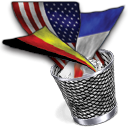|
New Year's Resolution: Trim the Fat on Your Hard Drive!
by M. Chris Stevens
While I have the good fortune to work on a very nice 24" Intel iMac (with a bunch of extras) at work, my setup at home can best be described as "rather out-of date." I've managed to keep my trusty PowerMac G4 (Sawtooth) up and running by tossing in some more RAM, an upgraded video card, and an early-model OWC Mercury Extreme. My infamous Wallstreet PowerBook, has had its useful life extended with some extra RAM, a couple PCMCIA cards, a new hard drive, and generous use of XPostFacto.
Why do I bring this up? Aside from the blatant advertising of some of the upgrades we have available here at OWC, it also can be used to illustrate the one major similarity between all these seemingly-disparate machines: Hard Disk space is at a premium.
With the iMac, all the Photoshop files, shareware demos, my gargantuan collection of fonts, and other things I use on a day-to-day basis tend to fill up my hard drive at a prodigious rate. On my Sawtooth at home, Garage Band and iMovie/iDVD are the culprits.
And my Wallstreet? Well... I’ve personally never been able to get around that annoying "First 8 GB" limitation on these machines. Even without installing all the "extras", over half of the of the (mandatory 8 GB maximum) boot partition winds up getting taken over by System files, leaving less room for other apps, much less the recommended "10 percent free space" on each drive.
There has to be a way to clear up some space...
Speaking your language...
One of the biggest wasters of space on your hard drive is the collection of unused language localizations for the OS. While being able to have all your system menus displayed in Swedish, for example, is interesting (or at least the basis for an amusing prank), the practicality of doing so is somewhat low, unless you happen to either develop for - or actually speak - the Swedish language.
Your average user, however, tends to use only one language on their computer. If you didn't do a custom installation when you installed OS X (where you can choose to just instal the language(s) of your choice), you likely have well over a gigabyte of pretty much useless information just sitting there taking up space - space that can easily be used for something a little more important to you.
Fortunately, there's a free utility that can take care of this for you. Monolingual does basically one thing - it removes all those unused languages from your system. It is also fairly straight-forward to use. Simply select all the languages you want to remove from your system, and then click "Remove". One warning screen and an Admin password later, the utility scours through the OS, removing the localized files. By removing all the languages except English and US English on a Stock install of OS X 10.4.8 on a Core 2 Duo MacBook, I saved over 2.5 GB! Your mileage may vary, but by simply removing these files, you can save some signficant space on your hard drive. Just be careful when running it; you can accidentally remove an impportant language to you, requiring to reinstall your OS! Not a fun undertaking...
A picture is worth 1000 words...
Another big source of bloat is that iPhoto library. I use iPhoto quite extensively for organizing my photos. Unfortunately, due to the way iPhoto is set up, it tends to make "backup" copies of each of your photos it manipulates. After a while, you wind up with a bunch of duplicate files. After a couple hundred photos (and, yes some people do have that many), that can add up to a lot of "wasted" space.
Rick Neil's free iPhoto Buddy has a number of tools to consolidate, organize and clean up your iPhoto library, getting rid of the duplicates (among other things) and generally speeding up the whole iPhoto experience, over all. While I have not had a chance to use the software extensively, the little bit I have used it has managed to save me quite a bit of space on my already-bloated Wallstreet's hard drive.
Clean it up...
Using just two free programs, you can free up several gigabytes worth of space on your hard drive. With some carefully-made backups (just in case) and careful attention when removing files, you can have your Mac running lean-and-mean.
|
1-800-275-4576




